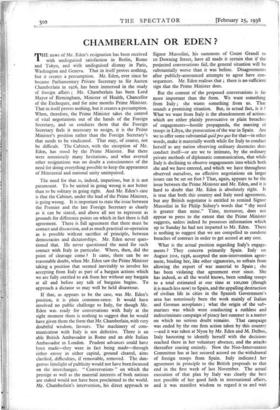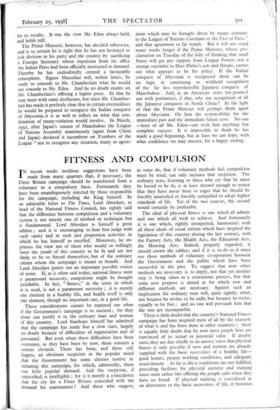CHAMBERLAIN OR EDEN ?
THE news of Mr. Eden's resignation has been received with undisguised satisfaction in Berlin, Rome and Tokyo, and with undisguised dismay in Paris, Washington and Geneva. That in itself proves nothing, but it creates a presumption. Mr. Eden, ever since he became Parliamentary Private Secretary to Sir Austen Chamberlain in 1926, has been immersed in the study of foreign affairs ; Mr. Chamberlain has been Lord Mayor of Birmingham, Minister of Health, Chancellor of the Exchequer, and for nine months Prime Minister. That in itself proves nothing, but it creates a presumption. When, therefore, the Prime Minister takes the control of vital negotiations out of the hands of the Foreign Secretary, and so conducts them that the Foreign Secretary feels it necessary to resign, it is the Prime Minister's position rather than the Foreign Secretary's that needs to be vindicated. That may, of course, not be difficult. The Cabinet, with the exception of Mr. Eden, has stood by the Prime Minister. But there were notoriously many hesitations, and what averted other resignations was no doubt a consciousness of the need for doing everything possible to keep the appearance of Ministerial and national unity unimpaired.
The need for that, is, indeed, imperious, but it is not paramount. To be united in going wrong is not better than to be solitary in going right. And Mr. Eden's case is that the Cabinet, under the lead of the Prime Minister, is going wrong. It is important to state the issue between the Premier and the late Foreign Secretary as clearly as it can be stated, and above all not to represent as grounds for difference points on which in fact there is full agreement. There is full agreement that there must be contact and discussion, and as much practical co-operation as is possible without sacrifice of principle, between democracies and dictatorships. Mr. Eden never ques- tioned that. He never questioned the need for such contact with Italy in particular. Where, then, did the point of cleavage come ? It came, there can be no reasonable doubt, when Mr. Eden saw the Prime Minister taking a position that seemed inevitably to involve his accepting from Italy as part of a bargain actions which we are fully entitled to ask from her without any bargain at all and before any talk of bargains begins. To approach a dictator so may well be held disastrous.
If that, as appears to be the case, was Mr. Eden's position, it is plain common-sense. It would have involved no public challenge to Italy, for though Mr. Eden was ready for conversations with Italy at the right moment there is nothing to suggest that he would have given them the form that Mr. Chamberlain, with very doubtful wisdom, favours. The machinery of com- munication with Italy is not defective. There is an able British Ambassador in Rome and an able Italian Ambassador in London. Prudent advances could have been made—they were in fact being made—through either envoy in either capital, ground cleared, aims clarified, difficulties, if removable, removed. The dan- gerous limelight of publicity would not have been focussed on the interchanges. " Conversations " on which the prestige as well as the material interests of both nations are staked would not have been proclaimed to the world. Mr. Chamberlain's intervention, his direct approach to Signor Mussolini, his summons of Count Grandi to to Downing Street, have all made it certain that if the projected conversations fail, the general situation will be substantially worse than it was before. Disagreements after publicly-announced attempts to agree have con- sequences. Mr. Eden realises that ; there is no sufficient sign that the Prime Minister does.
But the content of the proposed conversations is far more important than the form. We want something from Italy ; she wants something from us. That sounds a promising situation. But, in actual fact, is it ? What we want from Italy is the abandonment of actions which are either plainly provocative or plain breaches of engagements—hostile propaganda, the massing of troops in Libya, the prosecution of the war in Spain. Are we to offer some substantial quid pro quo for that—in other words, make it materially worth while for Italy to conduct herself as any nation observing ordinary decencies does conduct itself—or are we to intimate, by the ordinary private methods of diplomatic communication, that while Italy is declining to observe engagements into which both she and we have entered, and which we have throughout observed ourselves, no effective negotiations on larger issues can be set on foot ? That, again, appears to be the issue between the Prime Minister and Mr. Eden, and it is hard to doubt that Mr. Eden is absolutely right. It is true that both this country and Italy need agreement, but any British negotiator is entitled to remind Signor Mussolini in Sir Philip Sidney's words that "thy need is greater than mine." Time, moreover, does not appear to press to the extent that the Prime Minister suggests, unless indeed he possesses information which up to Sunday he had not imparted to Mr. Eden. There is nothing to suggest that we are compelled to condone breaches of contract in order to get accord at any cost.
What is the actual position regarding Italy's engage- ments ? They concern primarily Spain. Italy on August 21st, 1936, accepted the non-intervention agree- ment, binding her, like other signatories, to refrain from allowing the export of war material to Spain ; she has been violating that agreement ever since. She has indeed, as all the world knows, been sending troops to a total estimated at one time at ioo,000 (though it is much less now) to Spain, and the appalling destruction of civilian life in cities in the Spanish Government's area has notoriously been the work mainly of Italian and German aeroplanes ; what the origin of the sub- marines was which were conducting a ruthless and indiscriminate campaign of piracy last summer is a matter on which no serious doubt remains. That campaign was ended by the one firm action taken by this country —and it was taken at Nyon by Mr. Eden and M. Delbos, Italy hastening to identify herself with the decisions reached there in her voluntary absence, and the attacks thereafter ceasing entirely. Now the Non-Intervention Committee has at last secured accord on the withdrawal of foreign troops from Spain. Italy indicate3 her agreement in principle to the British proposals to that end in the first week of last November. The actual execution of that plan by Italy was clearly the best test possible of her good faith in international affairs, and it was manifest wisdom to regard it so and wait for its results. It was the view Mr. Eden always held, and holds still.
The Prime Minister, however, has decided otherwise, and is so certain he is right that he has not hesitated to risk division in his party and the country by sacrificing a Foreign Secretary whose expulsion from his office the Italian Press had been officially instructed to demand. Thereby he has undoubtedly created a favourable atmosphere. Signor Mussolini will, within limits, be ready to concede to Mr. Chamberlain what he would not concede to Mr. Eden. And he no doubt counts on Mr. Chamberlain's offering a higher price. In that he may meet with some disillusion, but since Mr. Chamber- lain has made it perfectly clear that in certain eventualities he would be prepared to recognise the Italian conquest of Abyssinia, it is as well to reflect on what that con- donation of treaty-violation would involve. In March, 1932, after Japan's seizure of Manchukuo the League of Nations Assembly unanimously (apart from China and Japan) declared it incumbent on Members of the League " not to recognise any situation, treaty or agree- ment which may be brought about by means contrary to the League of Nations Covenant or the Pact of Paris," and that agreement so far stands. But it will not stand many weeks longer if the Prime Minister, whose pro- clamation on Tuesday of the folly of thinking that small States will get any support from League Powers was a strange rejoinder to Herr Hitler's acts and threats, carries out what appears to be his policy. If the Italian conquest of Abyssinia is recognised there can be no logic in continuing to withhold recognition of the far less reprehensible Japanese conquest of Manchukuo. And, as an American critic has pointed out with pertinence, if that, why not recognition of all the Japanese conquests in North China ? In the light of that the Prime Minister will perhaps think again about Abyssinia. On him the responsibility for the immediate past and the immediate future rests. No one —least of all Mr. Eden—can wish him anything but complete success. It is impossible to think he has made a good beginning, but at least we can hope, with what confidence we may muster, for a happy ending.

















































 Previous page
Previous page